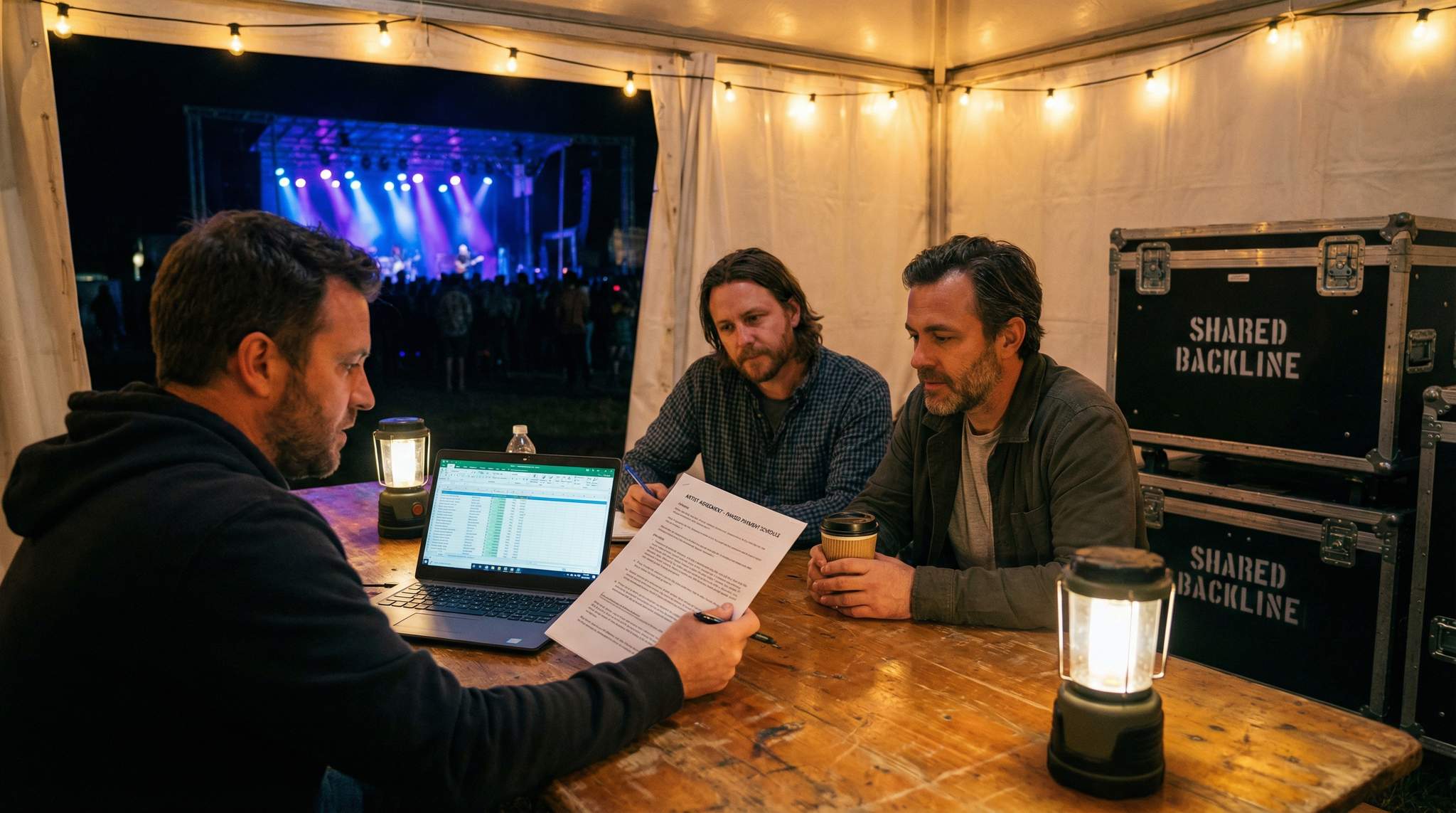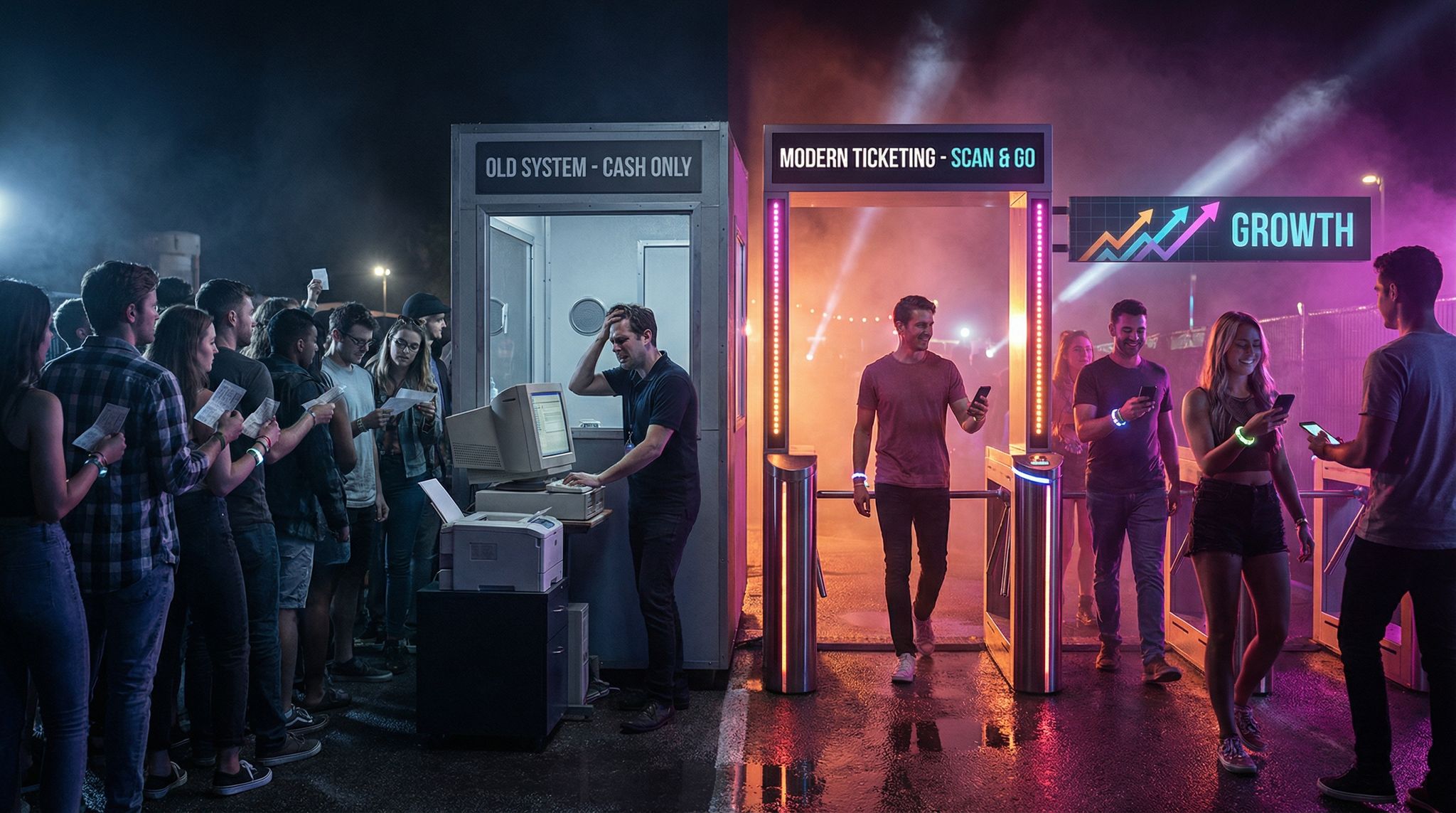Synopsis: Splitting artist payments smartly, sharing resources like backline gear, balancing exclusivity with community engagement, and paying on time are crucial strategies for boutique festival organisers to manage cash flow without burning bridges. These proven tactics – drawn from real festival experiences across the globe – ensure you can secure great talent while keeping your festival’s finances healthy and relationships strong.
Smart Payment Schedules – Split Payments Sensibly
One of the first challenges a festival producer faces is negotiating the payment schedule for artists. It’s standard for contracts to ask for 50% of the artist fee as a deposit (often upon signing or 30 days before the show), a practice where standard deposits are normally accepted. For a boutique festival with tight cash flow, handing over large sums months in advance can strain the budget. The key is to split payments sensibly. For example, instead of a hefty 50% upfront deposit, propose a phased payment schedule – say 25% on signing, another 25% a few weeks before the event, and the balance after the performance. Many booking agents are open to such structures, especially if you have a trustworthy track record.
Negotiating a smaller deposit protects your working capital while still showing the artist you’re committed. Remember that agents assess risk: if you’re a first-time festival or booking an especially high?fee headliner, they might insist on a larger upfront amount to ensure you have skin in the game, although standard deposit structures are usually negotiable. On the other hand, once you’ve established a solid relationship by paying on time every time, some agents may even reduce the required deposit to a token sum like 10%, as established relationships often allow for flexible terms. The legendary Glastonbury Festival in England, for instance, became known for relatively modest artist fees (compared to corporate-backed events) but still consistently attracts top talent – a testament to its credibility and the non-monetary value artists see in playing there. The lesson for boutique festivals is that reputation can sometimes compensate for budget. Work up to more favourable terms over time by being reliable and transparent. If an agent or artist knows you’re good for the money, they’re more likely to accept a split-payment plan that eases your cash flow.
Avoiding Onerous Deposits
While some deposit is almost always needed to confirm a booking, avoid agreeing to onerous terms that could jeopardise your festival’s finances. An onerous deposit might be an excessively large percentage (e.g. 75-100% upfront) or payments due far in advance of when ticket revenue comes in. Small boutique festivals in New Zealand or India have learned to push back on such terms; instead of paying 100% months early, they negotiate for a reasonable deposit and final settlement closer to the show date when ticket sales cash is in hand. If an artist’s agent demands an unusually high deposit due to your event’s newness, try offering other assurances – references from vendors or other artists you’ve paid, evidence of sponsorship funding, or even an escrow account. The goal is to give them confidence without draining your accounts long before showtime.
Accept Payments Across 8 Global Markets
Local currency processing in the US, UK, Canada, Australia, New Zealand, India, Indonesia, and Mexico with region-specific payment methods.
Be mindful of what your payment timeline commits you to. Ensure deposit due dates align with your income schedule (for instance, after a big batch of ticket sales or sponsorship payments). Never make a promise you can’t keep – failing to pay a deposit on time can be considered a breach of contract, allowing the artist to cancel the gig and still keep any money already paid. (In one scenario, a festival that missed a deposit deadline was warned by the agent that the artist could pull out and demand the full fee as cancellation—a risk highlighted in guides on payment schedule scenarios—an extreme but possible outcome.) To avoid such nightmares, set conservative payment milestones you are confident you can meet. It’s better to negotiate a smaller initial deposit or a later due date than to agree to an early 50% and come up short. Communication is key: if you foresee any difficulty in making a payment on time, talk to the agent well in advance. Festival veterans around the world – from the US to Singapore – stress that honesty and proactiveness will preserve your reputation in those rare cases when you need a bit of flexibility.
Shared Backline to Cut Costs for Everyone
Another practical way to respect your cash flow (and your artists’ budgets) is to offer a shared backline. The backline refers to the amps, drums, keyboards, and other on-stage equipment that bands use. Instead of having each artist ship or haul their own heavy gear (a costly endeavor, especially for international acts), many festivals provide a standardised backline that all performers can share. In fact, virtually every music festival leans on backline rental companies to supply gear for the event, as the business of backline rental is integral to festival operations. Boutique festivals benefit greatly from this approach: by renting a quality drum kit and amplifiers for the stage, you eliminate the need for each band to bring their own or for you to pay individual freight expenses.
Planning a Festival?
Ticket Fairy's festival ticketing platform handles multi-day passes, RFID wristbands, and complex festival operations.
For example, WOMAD (World of Music, Arts and Dance) festivals and smaller jazz festivals often arrange a common backline to accommodate multiple artists smoothly – a visiting funk band from France can plug into the same professional drum set that a local fusion group used earlier, with just minor adjustments. Not only does this save on shipping and air freight, it also speeds up changeovers between acts. At multi-band festivals like SXSW showcases in the US or Laneway Festival in Australia/Singapore, shared backlines are the norm, allowing artists to play back-to-back on tight schedules without lengthy setup times.
The shared backline strategy has a ripple effect on talent deals: when you tell an artist you’ll provide all the bulky gear, it often factors into their cost calculations. A DJ from London playing a boutique festival in Indonesia might lower their fee if the organiser is supplying industry-standard CDJs and mixers on site, because it saves them the trouble and cost of shipping equipment. Likewise, a rock band flying in to a festival in Mexico appreciates not having to cargo their amp cabinets and will see that as added value you’re providing. It’s a win-win – the festival saves money overall by renting or owning a set of gear used by all, and the artists save on logistics (and potentially pass those savings back in the form of a friendlier price or at least goodwill).
To implement this, work early in the planning to advance each artist’s technical rider and figure out a common denominator for gear. You might not be able to fulfill every esoteric request, but you can cover the basics (e.g. a 5-piece drum kit, Fender and Marshall amps, a decent keyboard) that satisfy most needs. Set a backline cap in your agreements – for example, you’ll cover standard gear but if an artist insists on something exotic beyond the agreed list, they cover the cost. This prevents last-minute surprises from blowing your budget. Most artists, especially at the boutique festival level, will be reasonable. They’d rather play the show with a shared amp than not play at all, and many are accustomed to adapting. Just ensure the gear you do provide is good quality and comes with tech support. Hiring a reputable local backline rental firm (or investing in some gear if you’ll reuse it annually) can significantly cut costs over the long term.
Reasonable Exclusivity in Exchange for Content
Festival bookings often come with exclusivity clauses, sometimes known as radius clauses. These prevent the artist from performing a nearby show within a certain time frame so that your event remains a special draw. Major festivals backed by industry giants have notoriously strict radius rules – for example, Lollapalooza once had a 300-mile, months-long radius that drew criticism for being overbearing, as noted in discussions regarding music festivals and the pursuit of exclusivity. As a boutique festival organiser, you likely don’t have the clout (or budget) to demand that level of exclusivity, and pushing for it could turn artists off. Instead, focus on a reasonable exclusivity that protects your interests without feeling onerous. This might mean asking that the artist doesn’t play another show in the same city or region for, say, 2-4 weeks before and after your festival. Or it could be a softer exclusivity like not appearing at a directly competing event, but allowing club shows or smaller appearances.
The key is to make exclusivity a two-way value exchange. If you are asking an artist to give up other gig opportunities in your market, consider trading something in return beyond just cash. One smart trade is exclusive content or special community moments involving the artist. For instance, instead of a blanket “no other shows within 100 km for 1 month” clause, you might negotiate a deal where the artist agrees not to announce any other local shows until after your festival, and in return, you will produce a high-quality live video of their festival performance that they can use for their own promotion. This kind of content is gold for artists’ social media and EPKs, and it gives them a reason to accept a bit of exclusivity.
Real-world example: Coachella in California streams many performances live on YouTube in HD, providing artists with huge exposure and professional footage. Acts that play Coachella often hold off other West Coast shows for a period, but they gain worldwide visibility in exchange. On a smaller scale, Imagine a boutique electronic festival in New Zealand that asks a DJ not to play any other NZ club gigs that week. The festival could arrange a special meet-and-greet or workshop for that DJ with local music students, turning the exclusivity into a community engagement opportunity. The DJ gets to build their fanbase and media content (pictures, press coverage from the workshop), and the festival gets a unique offering for its audience.
Need Festival Funding?
Get the capital you need to book headliners, secure venues, and scale your festival production.
Festival producers like Seth Fein of Illinois’s Pygmalion Festival understand this balance well. Seth explains that he includes a radius clause in artist offers but always marks it “NEGOTIABLE” and opens a conversation: “I expect this amount of radius, but let’s talk. Let’s be human about this and try to come up with a solution that makes the most sense for both festival and artist.” This approach is highlighted in articles about radius clauses and festival bookings. In practice, that might mean reducing the exclusivity window or distance if an artist can add value in other ways. Perhaps the band will do an exclusive acoustic set for your festival’s YouTube channel, or collaborate with a local artist onstage for a one-off performance – moments that create buzz for your event.
Another angle is to leverage festival community moments as part of the deal. Many boutique festivals pride themselves on a sense of community and uniqueness. If an artist buys into that culture, they might be willing to agree to play only your festival during that tour leg, as long as they feel it’s a special experience. For instance, at the Rainforest World Music Festival in Malaysia, artists from around the globe not only perform on the main stage but also participate in daytime workshops jamming with other musicians and locals. These organic, joyous sessions are filmed and often shared, benefiting the artists with authentic content and creating a deeper connection. Artists often value such experiences – it’s not just another date on the tour, but a memorable event. Use this to your advantage: offer artists a platform to do something unique at your festival (premiere a new song, host a Q&A, be part of a cultural exchange), which they wouldn’t get at a standard venue show. In return, ask for that reasonable exclusivity to help make your festival the standout event for fans in your area.
Above all, keep exclusivity clauses reasonable and clear. Don’t surprise an act with hidden radius demands late in negotiations; be upfront in the offer stage about what you’re asking. And listen to their concerns – maybe they already have a prior tour date near your window. Be flexible; you might waive exclusivity this time or narrow the scope, and bank goodwill for the future. A fair deal here sets the tone for a positive working relationship.
Pay on Time, Every Time
This advice might seem obvious, but it cannot be stressed enough: always pay your artists on time, every time. For all the talk of clever deal structures and negotiation tactics, failing to pay promptly is the fastest way to lose credibility as a festival organiser. The live music industry is surprisingly small when it comes to reputation – booking agents and artists talk to each other. If a festival develops a reputation for late payments or, worse, stiffing artists, word will spread and major talent will steer clear. On the flip side, festivals known for rock-solid payment records often get preferred treatment in routing and booking.
Develop a payment process that is bulletproof. Typically, you’ll owe the remaining balance of an artist’s fee either just before the show or immediately after the performance. Many festivals prepare envelopes with checks (or arrange bank transfers) that are handed to the tour manager on show day. Some artists will accept final payment a couple of days before the event via wire transfer – whichever method, execute it exactly as agreed in the contract. For example, if your contract with a Berlin DJ says “50% deposit, 50% on day of show via wire,” make sure that money hits their account the day of the show. Being even a day late can cause unnecessary alarm and damage trust. As South African artist The Kiffness wryly noted, promoters really fall into two categories: “Those that pay on time, and those that don’t,” according to The Kiffness’s artist guide to getting paid. Strive fiercely to be in that first category.
As an organiser, leverage tools to stay on top of obligations. For example, an integrated platform like Ticket Fairy provides real-time budget tracking and automated reminders for payment deadlines, which helps ensure no artist fee slips through the cracks. Having a digital aid to monitor deposits and balances due can reinforce your reputation for reliability.
Paying on time isn’t just about avoiding negative fallout; it actually buoys your festival’s long-term finances. How so? Consider that agents might start requiring bigger deposits or even full payment up front if they doubt you’ll settle after the show. That ties up more of your cash earlier. Conversely, if you build a reputation for prompt payment, agents may extend more lenient terms (as mentioned, some might take only 10% deposit next time or let you pay the balance a few days post-event) because they trust you. It also means in a crunch, you might be able to ask for a short extension once in a blue moon – and they’ll grant it because your word is good.
Different countries have different norms, but the principle is universal. In India, for instance, some independent festivals ensure all artists are paid the very night of their performance in cash or immediate transfer – it’s a point of pride to close accounts before the artist leaves the site. In the UK, where banking is fast, same-day BACS payments are common to settle fees. Whatever the context, double-check your payment methods and have backups. If one headliner must be paid in cash, have that cash ready in a secure safe on site (with proper security procedures). If another requires a wire, initiate it according to bank cut-off times. As a boutique festival organiser, you might be wearing many hats, but no excuse will save you if you simply forget to pay an artist on time.
Also, pay everyone else on time – your contractors, crew, and vendors – because word travels within those circles too. Agents often ask around about new festivals. If your name comes up as slow to pay production vendors or local openers, that can spook a headliner’s agent. Demonstrating professionalism in all financial dealings builds an overall aura of trust.
Trust Keeps the Talent Coming
In the festival world, trust is currency. When you handle deals in a way that respects both the artist’s needs and your own cash flow, you cultivate trust. This keeps the doors open for future talent bookings and even opens up routing opportunities. Routing refers to how artists plan their tours or festival hops – a trusted festival becomes a must-stop on an artist’s touring circuit, because the artist (and their team) know that the show will go smoothly and they’ll be treated right.
Consider the network of boutique festivals in Europe or Asia where artists often play several festivals in a row. Why do international bands travel thousands of miles to play a 5,000-capacity festival in, say, Japan one weekend and a similar-sized one in South Korea the next? Often it’s because promoters talk and coordinate, and they’ve built a trust that if one festival books the flights, the next will not cancel last-minute and leave the artist stranded. Agents might be more inclined to arrange a mini tour of regional festivals for their acts if they firmly trust each organiser involved. Trust keeps routing open – if your festival has a good name, you might get a call that a band you’ve been chasing is coming through your area, giving you first dibs on a date because the agent knows you’ll handle it professionally.
A great example is the relationship between festivals and artists on the summer circuit. Primavera Sound (Spain) and Roskilde (Denmark), both starting from indie roots, earned reputations for excellent artist care and integrity. Acts that play these festivals often return in future years or play the festival’s sister editions (Primavera has expanded to multiple countries) because they trust the organisers. Or take regional collaborative routing: the Laneway Festival, originally an Australian boutique event, expanded through Asia-Pacific by being reliable – artists would sign on to do Auckland, Sydney, Singapore, etc., in one go, confident that each stop would deliver on promises. If any one of those had a trust breakdown (say, not paying on time or poor treatment), the whole chain could fall apart with artists pulling out.
For your boutique festival, building trust starts with the deal points we covered: fair payment schedules, not overpromising, delivering what you say you will (gear, hospitality, marketing support), and honouring exclusivity in good faith. It also extends to the intangible but crucial realm of relationships. Be honest and ethical in all interactions. Don’t hide bad news – if ticket sales are slow and you’re worried, it’s better to proactively assure artists that you’re securing their fee (perhaps by placing funds in escrow or confirming a sponsor) than to go radio-silent and freak everyone out.
Trust is also a two-way street. Show the artists and agents that you trust them as well – for example, once you’ve signed a contract with an act, stop shopping around for a “cheaper” replacement and cancelling on them. (It should go without saying, but unfortunately some new promoters make this mistake, burning bridges in the process.) If you expect commitment from talent, reciprocate with commitment to them. When artists feel valued and secure, they’ll give better performances and often be more flexible in negotiations.
Finally, keep in mind that your festival’s reputation is being built with every deal. Showcase the positive experiences: get testimonials from artists or quotes in the media about how well your festival treated them. This can become public proof of your trustworthiness. For example, if the lead singer of a band mentions on social media that “XYZ Festival in Bali had the best hospitality and settled everything instantly – can’t wait to return,” it not only pleases your marketing team but also signals other artists that your event is a safe bet.
In summary, trusting relationships are arguably your most valuable asset as a festival producer. When cash flow is tight, trust and goodwill fill the gaps – you might get more time to pay a bill, or an artist might agree to that video shoot in lieu of a higher fee, simply because they like working with you. And that is earned by consistent, respectful business practices.





